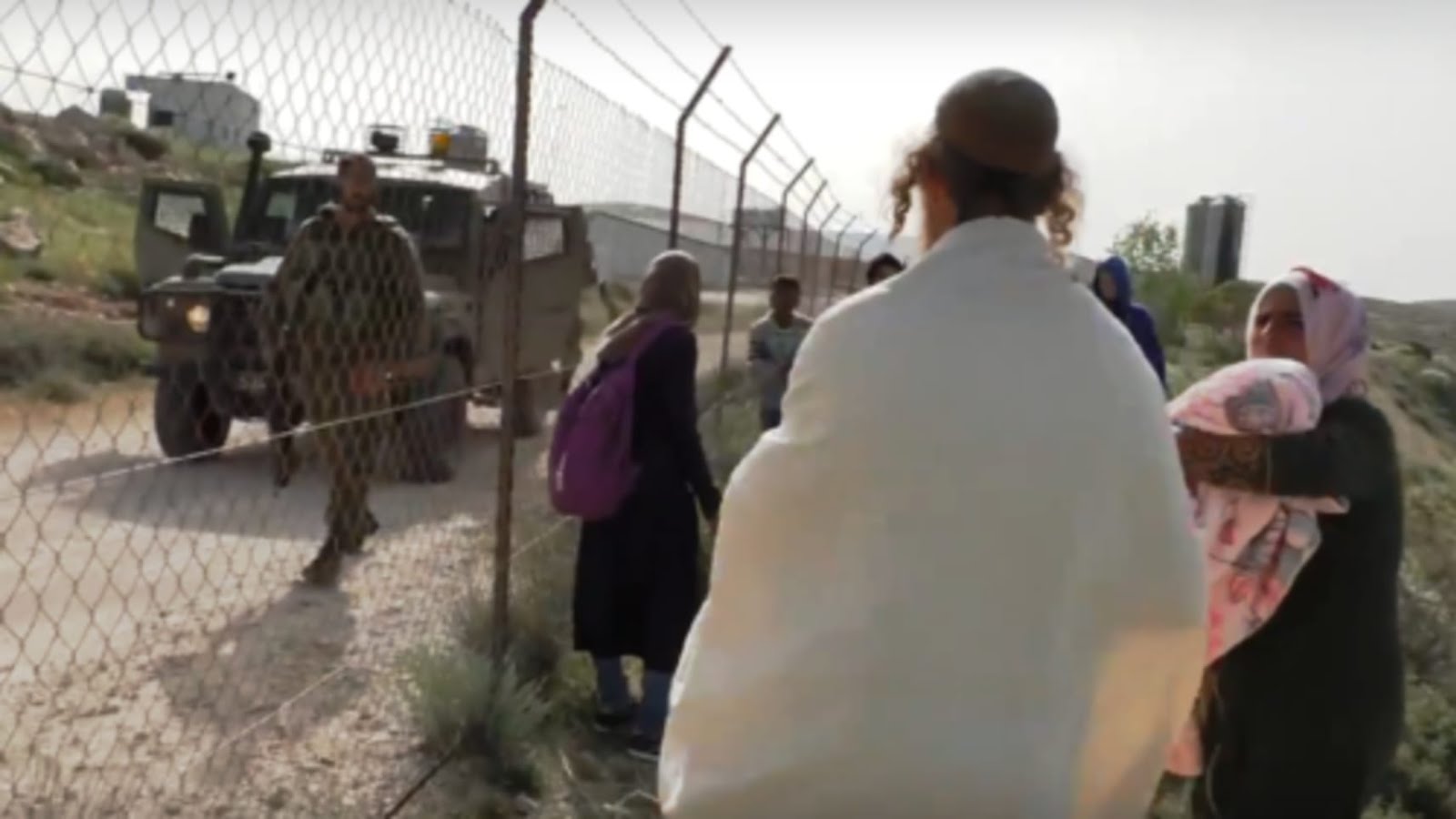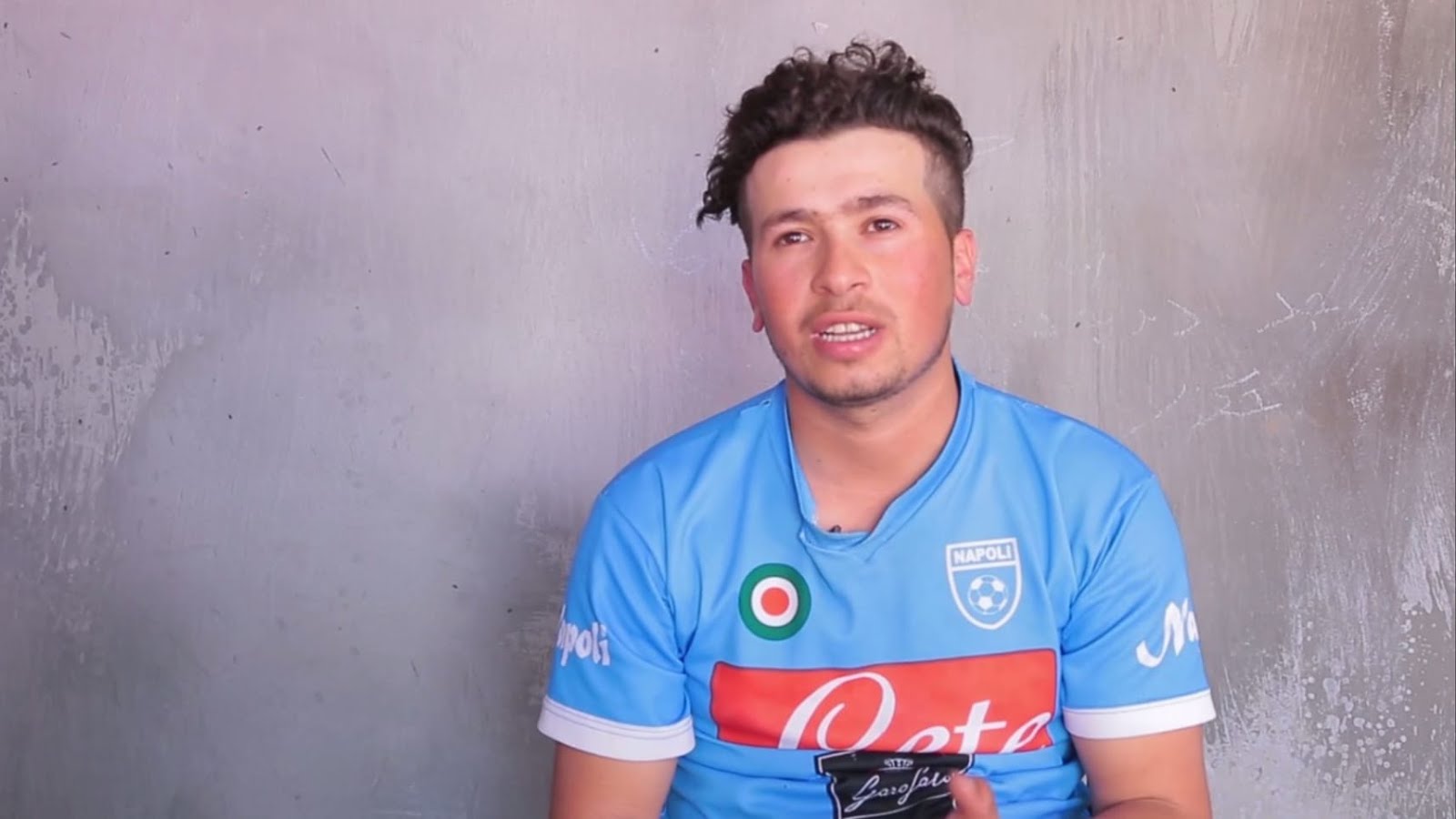Israeli security forces repeatedly ignore racist attacks on palestinian schoolchildren
Haaretz,
june 7, 2018
South
Hebron Hills’ students forced to choose between education and security as a
rabbinical group launch a new campaign on their behalf
Hebron Hills’ students forced to choose between education and security as a
rabbinical group launch a new campaign on their behalf
 |
| Extremist settler harasses Palestinian children and mother in front of soldiersRabbis for human rights |
Amid
extremist settler violence, pursuing an education is an act of bravery:
extremist settler violence, pursuing an education is an act of bravery:
Getting
an education is a way to fight back for 22 year old Ali from the West Bank
village of Tuba. For the past ten years continuing until today, extremist
Israeli settlers have terrorized him and other children from his community on
their walk to school in the village of A Tuwani. In these Palestinian villages
seeking out a life in the isolated, arid West Bank region known as the
South Hebron Hills, ethnically-motivated violence and intimidation tactics
targeting children has become routine — though no less horrifying.
International activists escort the Palestinian children to their school
and monitor the attacks initiated by Israeli extremists coming from the
direction of the illegal outpost Havat Maon.
an education is a way to fight back for 22 year old Ali from the West Bank
village of Tuba. For the past ten years continuing until today, extremist
Israeli settlers have terrorized him and other children from his community on
their walk to school in the village of A Tuwani. In these Palestinian villages
seeking out a life in the isolated, arid West Bank region known as the
South Hebron Hills, ethnically-motivated violence and intimidation tactics
targeting children has become routine — though no less horrifying.
International activists escort the Palestinian children to their school
and monitor the attacks initiated by Israeli extremists coming from the
direction of the illegal outpost Havat Maon.
 |
| Ali, now a college student, used to be attacked while walking to A Tuwani’s elementary school. Rabbis for human rights |
Attacks
on Palestinian students in the region have become so common that the Knesset
Committee for the Protection of the Child has discussed the issue. Ali admits
to making excuses to not attend school as a result of his fear, and describes
frightening incidents where settlers used their own children to ambush
Palestinian children on their way to school. Despite this, Israeli security
forces often ignore attacks on Palestinians in general and on the students at A
Tuwani in particular (as documented here),
and the problem extends beyond the attacks to the ineffective or nonexistence
response of the Israeli authorities. As far as we know, security forces
have not ramped up their efforts to catch those responsible, while no suspect
has been detained let alone brought to justice.
on Palestinian students in the region have become so common that the Knesset
Committee for the Protection of the Child has discussed the issue. Ali admits
to making excuses to not attend school as a result of his fear, and describes
frightening incidents where settlers used their own children to ambush
Palestinian children on their way to school. Despite this, Israeli security
forces often ignore attacks on Palestinians in general and on the students at A
Tuwani in particular (as documented here),
and the problem extends beyond the attacks to the ineffective or nonexistence
response of the Israeli authorities. As far as we know, security forces
have not ramped up their efforts to catch those responsible, while no suspect
has been detained let alone brought to justice.
Instead,
the security forces offer an inadequate and frankly bizarre solution: a
military jeep to escort the children to and from school each day. The escort
repeatedly comes late, if it comes at all. Such a “solution” forces Palestinian
school children to choose between their safety and their right to education.
Refusing to let these extremists prevent him from reaching his potential, Ali
overcame his fears and completed high school. He is now pursuing a bachelor’s
degree and views his education as a direct challenge to the violence of the
extremist settlers and the oppression he has been confronted with living under
Israeli military control.
Now Rabbis for Human Rights (RHR), an Israeli
Zionist rabbinical rights group teamed up with Italian activist collective
Operation Dove (associated with the Catholic Church) to pressure the Israeli
government to stop what they see as a disgrace for the Jewish state. They have
launched a letter writing campaign
asking American Jews to channel their progressive values and political
influence to call upon the Israeli government to ensure the safety of
Palestinian children pursuing an education amid deep poverty and
marginalization.
Zionist rabbinical rights group teamed up with Italian activist collective
Operation Dove (associated with the Catholic Church) to pressure the Israeli
government to stop what they see as a disgrace for the Jewish state. They have
launched a letter writing campaign
asking American Jews to channel their progressive values and political
influence to call upon the Israeli government to ensure the safety of
Palestinian children pursuing an education amid deep poverty and
marginalization.
Compared
to other parts of the West Bank, the villages of the A Tuwani area were rarely
part of the violent conflict. This isolated, rural district— where people often
live in caves without electricity, running water or other infrastructure— is
distanced geographically, economically and culturally from the backbone of
Palestinian society. Yet its inhabitants pay a severe price just for being
Arabs. “Israel is facing numerous security threats that sometimes challenge its
capacity to adhere to human rights principles,” RHR acknowledges, “but when we
talk about protecting Palestinian schoolchildren in the quiet, rural community
of A Twuani, far from any fighting zone, one just cannot conceive of any
reasonable justification for this shocking moral failure that demands our
outrage as Jews and Israelis.”
to other parts of the West Bank, the villages of the A Tuwani area were rarely
part of the violent conflict. This isolated, rural district— where people often
live in caves without electricity, running water or other infrastructure— is
distanced geographically, economically and culturally from the backbone of
Palestinian society. Yet its inhabitants pay a severe price just for being
Arabs. “Israel is facing numerous security threats that sometimes challenge its
capacity to adhere to human rights principles,” RHR acknowledges, “but when we
talk about protecting Palestinian schoolchildren in the quiet, rural community
of A Twuani, far from any fighting zone, one just cannot conceive of any
reasonable justification for this shocking moral failure that demands our
outrage as Jews and Israelis.”
The
easiest crime to solve somehow remains unsolved
easiest crime to solve somehow remains unsolved
By their
nature, the attacks against A Tuwani’s students are the easiest crimes to
solve: they occur on a specific short route where security forces intensely patrol,
during unchanging and known time frames (when the children are traveling to
school or returning home) and have occurred in the same pattern for years.
Furthermore, the assailants mostly come from a small outpost nearby, Havat
Maon, whose population is minimal, and so suspects (mostly young adults) are
not hard to pinpoint. To boot, a multitude of documentation of the
assaults exist.
nature, the attacks against A Tuwani’s students are the easiest crimes to
solve: they occur on a specific short route where security forces intensely patrol,
during unchanging and known time frames (when the children are traveling to
school or returning home) and have occurred in the same pattern for years.
Furthermore, the assailants mostly come from a small outpost nearby, Havat
Maon, whose population is minimal, and so suspects (mostly young adults) are
not hard to pinpoint. To boot, a multitude of documentation of the
assaults exist.
In light
of this, one would expect arrests and justice for these racist thugs. Yet, as
far as the human rights community knows, no one has ever been arrested in
relation to the attacks.
of this, one would expect arrests and justice for these racist thugs. Yet, as
far as the human rights community knows, no one has ever been arrested in
relation to the attacks.
This
failure is not the result of a lack of capacity on the part of the security
forces. Indeed, Israel’s security forces rightly hold a reputation for catching
terrorists and criminals, especially in the West Bank. This failure is a matter
of treating the security of Palestinians, even little children, as secondary.
This is, then, not just the racist actions of a fringe group of bullies, but
rather a policy of discriminatory law enforcement by the Israeli security
forces and the government overseeing them. In this new campaign, RHR
calls on the Jewish world to help end this disgrace and violation of Jewish
values. “When a stranger resides with you in your land, you shall not wrong
him” (Leviticus 19).
failure is not the result of a lack of capacity on the part of the security
forces. Indeed, Israel’s security forces rightly hold a reputation for catching
terrorists and criminals, especially in the West Bank. This failure is a matter
of treating the security of Palestinians, even little children, as secondary.
This is, then, not just the racist actions of a fringe group of bullies, but
rather a policy of discriminatory law enforcement by the Israeli security
forces and the government overseeing them. In this new campaign, RHR
calls on the Jewish world to help end this disgrace and violation of Jewish
values. “When a stranger resides with you in your land, you shall not wrong
him” (Leviticus 19).


